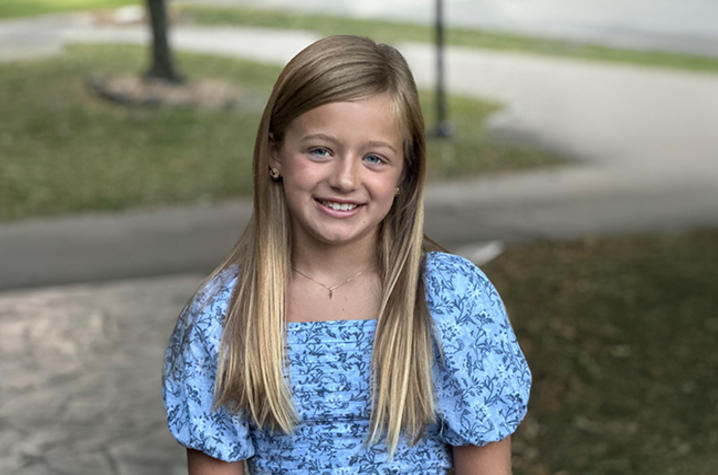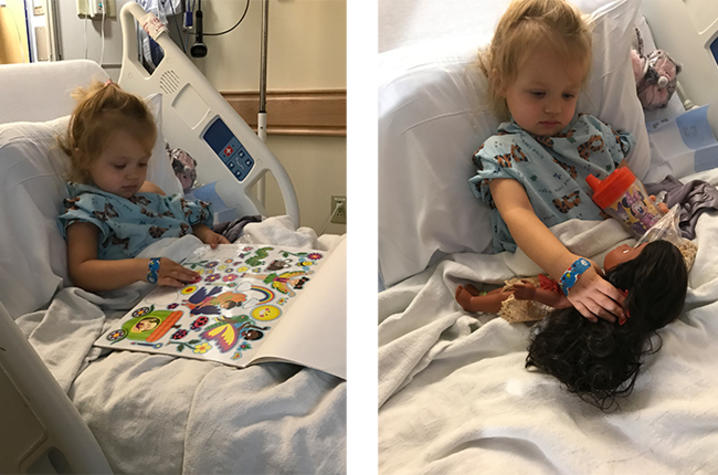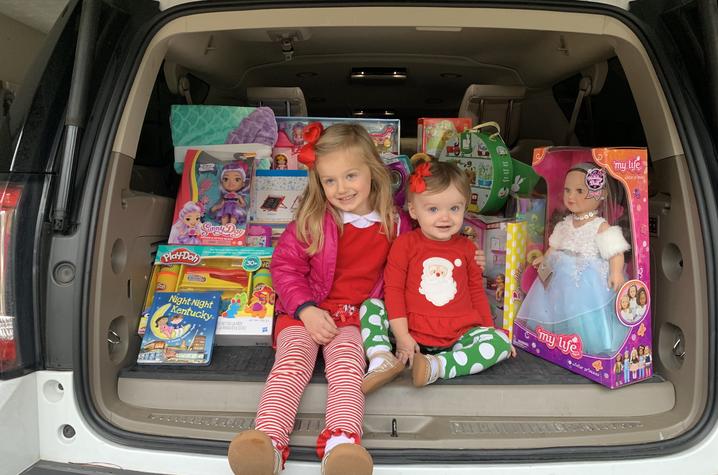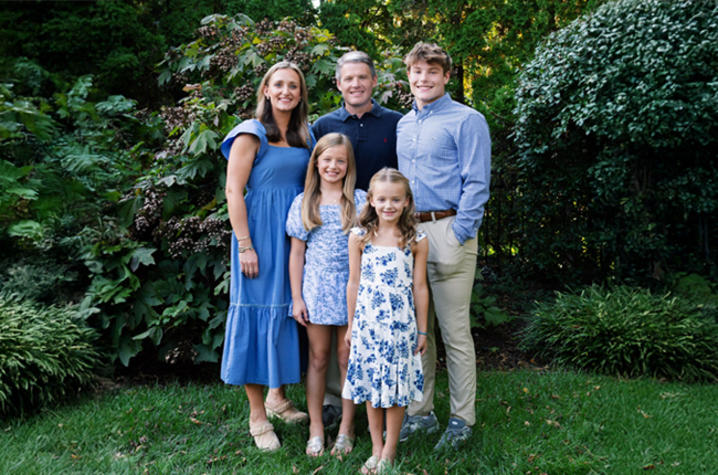Young UK patient’s resilience inspires new tradition of giving back
LEXINGTON, Ky. (Dec. 23, 2024) – It all started with a fever. But it ended with Lexington’s Harper Dougherty defying all odds.
During Labor Day weekend in 2017, two-year-old Harper felt unwell and had a mild fever. As little kids often come down with mild illnesses, Harper’s mother Laura figured a quick trip to the pediatrician, along with a day or two off from daycare would have Harper better in no time.
Diagnosed with a simple virus, the Doughertys were sent home. But soon Harper showed other symptoms, including stomach pain. A second trip to the doctor returned a diagnosis of a urinary tract infection. Harper was given antibiotics and sent home again.
Within a few days, Harper’s condition continued to worsen. Laura and her husband, Joey, noticed a change in the color of Harper’s skin. For the third time that week, they went to the pediatrician, where Harper got an X-ray.
Laura’s background is in pharmaceuticals, and her father-in-law is an infectious disease physician, so the family has more than the average understanding of diagnostic testing. Sensing something was missed in Harper’s tests, she snapped a photo of the X-Ray and sent it to her father-in-law.
His quick response was chilling: Harper needed to go to the emergency department right away.
At the Makenna David Pediatric Emergency Center at Kentucky Children’s Hospital (KCH), Harper underwent additional imaging, including an ultrasound. Her abdominal pain wasn't a UTI. Her tests revealed her lungs were filled with fluid. The Doughertys were told she would need surgery, but should be out of the hospital in a couple of days.
On Sept. 9, 2017, Harper underwent video-assisted thoracis surgery (VATS), a minimally invasive procedure that allowed the surgeons to access her chest cavity without a large incision. After the surgery, Laura and Joey were given devastating news. The official diagnosis was pneumonia and the damage caused by the fluid and infection was worse than anticipated. Harper’s surgery was more extensive than what was originally planned. She was diagnosed with a stage 3 empyema — an uncommon condition that can occur as a result of pneumonia.
Jamshed F. Kanga, M.D., chief of the Division of Pediatric Pulmonology Medicine at KCH and a member of Harper’s care team, noted that Harper’s abdominal pain isn’t an uncommon symptom of pneumonia in children.
“Children with strep throat, pneumonia can present with abdominal pain,” he said. “There are numerous cases where a child was taken to surgery with presumed appendicitis only to find out they had a pneumonia.”
Empyema is a condition where pockets of pus collect inside a body cavity and can lead to bacterial infections if left untreated. Harper also had an abscess in her lung and fluid buildup around her lungs. Her surgeons noted the pus in her lungs had a “consistency like pizza cheese.”
“Very rarely, I would say less than one in 1000 children admitted for pneumonia develop empyema,” said Kanga.
They were unsure of what caused it to accumulate so quickly — likely the result of an infection combined with bad luck. The infection was removed, and a drain was inserted to siphon away the pus and fluid. The pressure of the pus, abscess and fluid caused Harper’s lung to collapse, so she was put on a ventilator.
Laura and Joey were devastated — and terrified. They had a newborn at home, and now a toddler in the pediatric intensive care unit (PICU) at Kentucky Children’s Hospital.
“We were very scared,” Laura said. “I was only a couple weeks postpartum so my mind was focused on caring for my newborn and being there for my 2-year-old. I took the day shift, and my husband took the night shift, and we just made sure she was never alone.”
While in the PICU, Harper received three blood transfusions, went into multi-organ failure because of the antibiotics, and had to be revived with the crash cart three times. Through the unimaginable stress, uncertainty and fear, Laura and Joey leaned on their family as well as Harper’s care team for comfort and reassurance.
“All we could think about was one day at a time,” she said. “We made sure we were attended rounds each morning to get updated by the team, which was amazing to be a part of — and hear their plan — for the day and coming days. My husband really stepped up and took the worst of it for us, concealing how bad things were at times. But we never would’ve been able to do any of it without the support of our amazing family, particularly our parents.”
Slowly, Harper started to improve. She was weaned off the ventilator and had to work hard to relearn potty training and how to walk. Through it all, Laura was in awe of Harper’s tenacity.
“She was determined,” she said. “She is fearless and independent and steadfast. She has always been that way and advanced in many ways throughout her early years. She handled recovery the exact same way.”
After 10 days in the hospital, Harper was discharged. At home, she continued to make incredible strides in her recovery. Within weeks, she was back at school and dance class.
“It was pretty incredible to see how quickly she turned around,” Laura said. “Kids are so resilient, and it was such a reminder to be so grateful for that.”
Although children are resilient, Kanga says there’s one way to help protect them from experiencing serious complications from respiratory and other diseases — vaccination.
“Certain infections are more likely to present with severe pneumonia, such as influenza infection that can also cause other serious illnesses including pneumonia and Kawasaki's disease,” said Kanga. “Getting children immunized and getting annual flu shots can help prevent these severe complications.”
Laura and Joey credit not just the medical support Harper received in the hospital for her complete recovery, but the spiritual and emotional support from the community and families, as well as the advice provided by Joey’s dad, Mark Dougherty, M.D.
“We are really thankful for the team at UK, particularly the surgical and ICU teams,” she said. “They were so attentive and made all the difference in Harper’s care and saving her life. I am also very thankful for our church and school community. The first piece of good news that we received about Harper was during a prayer vigil at our church.”
While Harper doesn’t remember any of her time at the hospital, there was one experience that has stuck with her over the years — visits from Jarrett’s Joy Cart.
A beloved KCH tradition that’s now in its 25th year, a team of volunteers makes weekly rounds with a cart full of toys, bringing a little cheer to patients and their families. The Joy Cart was founded by KCH patient Jarrett Mynear, who wanted to provide his fellow patients with a happy distraction while in the hospital. Jarrett died in 2002, but his family keeps the cart rolling on in his memory.
“We see families who are in crisis situations,” said Jarrett’s mother, Jennifer. “They do take notice, not just of our purpose, but that moment of joy. One of our sayings is in joy, there is a moment of healing.”
“The Joy Cart was amazing,” said Laura. “Along with the Child Life services, it provided a much-needed break from the monotony of the hospital. I don’t remember exactly what she got, but I do remember there was some art and stuffed animals involved. ‘Moana’ was her absolute favorite at the time, so I am pretty sure she got some ‘Moana’ stuff as well.”
Gratified by the joy of the Joy Cart, Harper has since used her near-Christmas birthday — Dec. 22 — to collect toys and gifts for the Joy Cart in years past.
“The Joy Cart brought us a moment of light during our darkest days, and we’re forever grateful for that kindness,” said Laura. “It’s why Harper now loves giving back to bring joy to other kids. She has used her birthday to return that kindness and share smiles with other children.”
Learn more about Jarrett’s Joy Cart here and how you can support the patients at KCH.
UK HealthCare is the hospitals and clinics of the University of Kentucky. But it is so much more. It is more than 10,000 dedicated health care professionals committed to providing advanced subspecialty care for the most critically injured and ill patients from the Commonwealth and beyond. It also is the home of the state’s only National Cancer Institute (NCI)-designated Comprehensive Cancer Center, a Level IV Neonatal Intensive Care Unit that cares for the tiniest and sickest newborns and the region’s only Level 1 trauma center.
As an academic research institution, we are continuously pursuing the next generation of cures, treatments, protocols and policies. Our discoveries have the potential to change what’s medically possible within our lifetimes. Our educators and thought leaders are transforming the health care landscape as our six health professions colleges teach the next generation of doctors, nurses, pharmacists and other health care professionals, spreading the highest standards of care. UK HealthCare is the power of advanced medicine committed to creating a healthier Kentucky, now and for generations to come.









